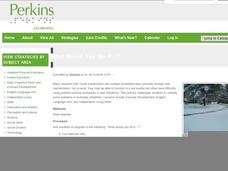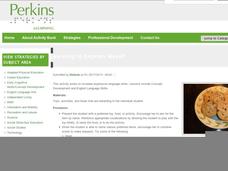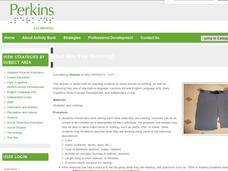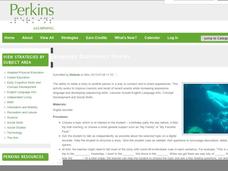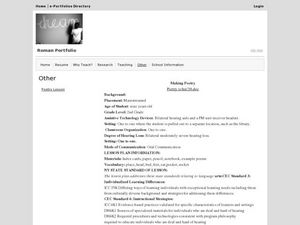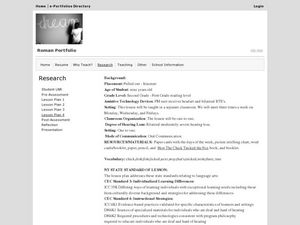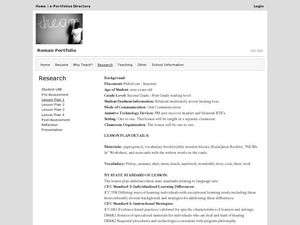Perkins School for the Blind
What Would You Do If...?
What would you do if...? That's a great question, and, when posed to learners with visual impairments, a question that can foster concept development and speaking and problem-solving skills that relate to real-life situations. The...
Perkins School for the Blind
Prepositions
When most children learn about prepositions, they are provided with a visual to show them the concepts of on, in, near, and beside. For learners with visual impairments, concepts need to be constructed in a very concrete way. A stuffed...
Perkins School for the Blind
Familiar Sounds
To foster concept development and auditory discrimination skills, learners with visual impairments listen to identify a variety of common sounds. The teacher makes recordings of various sounds, including those found in the home, at the...
Perkins School for the Blind
Learning to Express Myself
Expressing one's wants and needs is vital for learners of any age or ability level. Young children with visual impairments and intellectual disabilities practice asking for preferred items, foods, or activities in a structured manner....
Perkins School for the Blind
Treasure Hunt
On, over, and under are some very common prepositions; but how can you teach these concepts to children with visual impairments? Here, is one way. Kids will practice following verbal commands as they go on a classroom treasure hunt. They...
Perkins School for the Blind
Silly or Sensible?
Is it silly or sensible? That's a great question, and it's the question that will drive this entire instructional activity. Learners with special needs and visual impairments work together to analyze verbal information. The instructor...
Perkins School for the Blind
Where Shall I Put It?
Position and positional phrases are concepts that need to be constructed for learners with low or no vision. Help them gain competence and a conceptual understanding of words like on, in, and under with a funny game. After gathering a...
Perkins School for the Blind
What Do I Hear?
Being able to give positive reinforcers to a child starts with knowing what the child likes. Intended for children with blindness, this lesson gives you a way to determine the types of music your learners like best. You are given a set...
Perkins School for the Blind
Learning Names of Articles of Clothing
What to wear today; such a vexing question. Spend some time introducing the names, fabrics, types, colors, and functions of various articles of clothing to your class. Each child will take turns asking each other what they are wearing....
Perkins School for the Blind
Conversation Skills
It is so important for learners with multiple disabilities to learn how to communicate for both social and functional reasons. Each child will choose a topic from the list and generate five questions related to that topic. They'll split...
Perkins School for the Blind
Circle Time
Oftentimes children or teens with one or more disability are reluctant to participate in whole-group activities. Foster good participation, verbal expression, and social skills through daily circle time activities. Each day you and your...
Perkins School for the Blind
Personal Information
"Hi, how are you? My name is___." Seems simple enough but it's not always that easy to recall and relate factual information about yourself. Learners with multiple disabilities practice memorizing and relaying personal information about...
Perkins School for the Blind
I'm Thinking Of...
Learning how to describe an object or a person is a great way to develop verbal and written expression. Learners with special needs improve their verbal expressive skills and concept development skills while playing a guessing game. The...
Perkins School for the Blind
Language Experience Stories
Here is a great way to bring core content to your special education classroom. Included is a set of instructional ideas intended to help learners increase their verbal and written expression through storytelling. Tape recorders, story...
Curated OER
ASL Lesson 18
Have a discussion, review nouns, and practice speaking using ASL. Lesson 18 of 30+ extensive lessons on using American Sign Language covers classifiers, coded English, and asking questions. Each link embedded in the lesson provides a...
Curated OER
Making Poetry
A hearing impaired student identifies rhyming words. In this rhyming word lesson for the hearing impaired, 2nd graders read and write poetry correctly using rhyming words.
Curated OER
How Do I know That a Book Is Just Right for Me to Read?
Students choose a book for reading. In this language arts lesson, students take steps to evaluate a book for free reading. Students make a list of words found in the book that they are unfamiliar with.
Curated OER
For the Birds
Second graders explore biology by creating birdhouses. In this bird identification lesson, 2nd graders discuss the different types of birds that live in their environment and what characteristics each type of bird has. Students create a...
Curated OER
Roman Portfolio
Student practice decoding skills and phonological awareness. For this vocabulary development lesson, student identifies new vocabulary through word association and flash cards. Student also reads How he Chick Tricked the Fox making...
Curated OER
Fill Me In
Second graders work on expanding their vocabulary. In this personal writing lesson, 2nd graders practice word identification and complete a worksheet by filling in the blanks.
Other popular searches
- Visually Impaired Blind
- Visually Impaired Lessons
- Visually Impaired Games
- Visually Impaired Art
- Visually Impaired Paper Art
- Visually Impaired Art Lesson
- Visually Impaired Science
- Visually Impaired Lesson Plans
- Visually Impaired P E
- Visually Impaired P. E.
- Visually Impaired Art Dance


